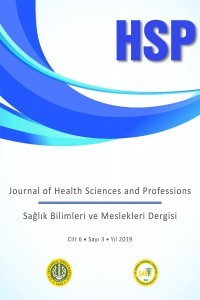Halk Sağlığı Akademik Personellerinin Afet Hazırlık Durumu İstanbul’dan Kesitsel Bir Araştırma
afet, afet hazırlığı, afet tıbbı, acil tıp
Disaster Preparation Status of Public Health Academic Staff a Cross-Sectional Study From Istanbul
disaster, disaster preparedness, disaster medicine, emergency medicine,
___
- 1. Internationally Agreed Glossary of Basic Terms Related to Disaster Management. Geneva: United Nations Department of Humanitarian Affairs; 1992.
- 2. Baskurt S. Karadag N. The Preparedness Status of Extraordinary Events of the Hospitals Deported to the Ministry of Health in Balıkesir Province. Modern Hastane Yonetimi Dergisi 2001;5(1):14-18.
- 3. Akdur R. Disaster Preparedness and Disaster Management. Ankara: Saglik ve Sosyal Yardım Vakfi, 2001. p.1-42.
- 4. Ergunay O. Turkey's Disaster Profile. Ankara; 2007. pp.1-15.
- 5. Barka, A. The next expected Marmara Earthquake. International Istanbul Earthquake Meeting. Istanbul: TUYAP Fuarcılık; 2000.
- 6. Burton P. Extreme Earthquake and Earthquake Perceptibility Study in Greece and Its Surrounding Area. Natural Hazards 2010; 32: 277-312.
- 7. Guler C, Akin L. Public Health Basics. Ankara: Hacettepe University Press, 2015. pp.1106-1129.
- 8. Investigations of Physician's Preparedness for Extraordinary Situations In Bedside Therapy Institutions. 1st edition. Ankara: Turk Tabipler Birligi Yayinlari, 2009.
- 9. Hisar MK, Yurdakul A. The Evaluation of Information about Health Services in Disasters of Nursing Students of a University. MAKÜ Sag. Bil. Enst. Derg. 2015; 3(2): 54-65.
- 10. Cakmak H, Er RA, Oz YC, Aker AT. Determinatıon of the Infl uencing Status of the Marmara Earthquake and Preparation Status For Possible Disasters of the 112 Emergency Staff In Kocaeli City Akademik. Acil Tıp Dergisi 2010; 2: 83-8.
- 11. Balyemez S, Berkoz L. Social Component in Earthquake Risk Mitigation. Itüdergisi. 2011; 10(1): 27-38.
- 12. Kadıoglu M. Afet Yönetimi: Waiting the Unexpected, Managing the Worst. Ankara: T.C. Marmara Belediyeler Birligi Yayini, 2011.
- 13. Yurdakul A, Piroglu F, Okay N. In the Framework of Existing Disaster Plan of Kocaeli Derince Education and Research Hospital, Evaluation of Disaster Preparedness of Employees. MAKÜ Sag. Bil. Enst. Derg. 2013; 1(2): 75-85.
- ISSN: 2148-7588
- Başlangıç: 2014
- Yayıncı: İstanbul Üniversitesi-Cerrahpaşa
Yaşlılarda Düşmeye Yol Açan Faktörler ve Koruyucu Rehabilitasyon Yaklaşımları
Acil Serviste Takip Edilen İntihar Girişimlerinin Maliyet Analizi*
Alp YILMAZ, Serkan DOĞAN, Utku Murat KALAFAT, Rabia Birsen TAPKAN, Ali SAĞLIK, Doğaç Niyazi ÖZÜÇELİK
Ebelik ve Hemşirelik Öğrencilerinin Egzersiz Davranışı, Sigara Bağımlılığı ve Genel Sağlık Durumu
Ayla GÜNAL, Funda DEMİRTÜRK, Halime ARIKAN, Büşra İNAL
Emriye Hilal YAYAN, Yeliz SUNA DAĞ, Mehmet Emin DÜKEN
Ebelerin Profesyonel Değerleri Ölçeğinin Geliştirilmesi
Şenay DEMİRBAŞ MEYDAN, Nurten KAYA
Üniversite Öğrencilerinin Fonksiyonel Gıdalar Konusundaki Farkındalıklarının İncelenmesi
Hemşirelik Öğrencilerinin Empati Düzeyleri Ve Problem Çözme Becerileri
Hülya ÜSTÜNDAĞ, Neşe BAYAR, Elif YILMAZ, Gülşah TÜREL
Hemşirelik Mesleğinin Gelişen Rolleri
